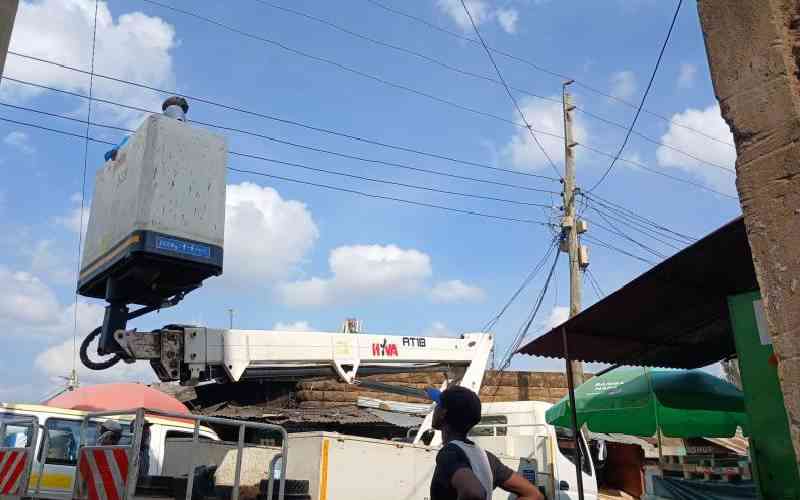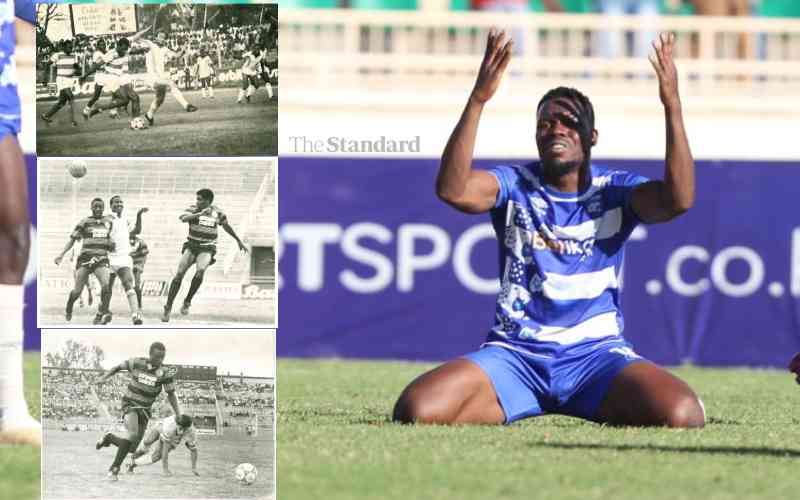Kenya: Less than five years ago, talks of a player transfer attracting a signing fee within the Kenyan football scene was as alien as snow in Africa. Player sales seemed a preserve of big European and South American football giants and in the process, amassing huge amounts in transfer deals.
But thanks to cash inflow to the local football arena from monied firms such as East Africa Breweries Ltd (EABL) and SuperSport International, which has bought the top-tier league broadcast rights, analysts contend that the new deal brokered by the Football Kenya Federation (FKF) values the local top-tier league at Sh4 billion, way above the current SuperSport deal worth Sh1.3 billion.
With changes in the football landscape, selling and buying players has taken root, bringing value to football activities outside the playing field. For instance, AFC Leopards sold mid-fielder Humphrey Mien to Tusker for Sh500,000 – a large sum by Kenyan standards. This is considering that a couple of years ago, a player would just walk away from a club for free.
cash inflow
Those numbers might not sound massive but when you consider the fact that the sector attracted virtually nil funding some years back, then this latest cash inflow is startling for the sport that has survived on bare minimum. The partnership works for these companies because of the huge boost their brand receives from associating with arguably the country’s most famous clubs.
“It is all changing now because there is money in the game. The Kenyan Premier league may not have attracted the money it deserves but with prudent management of the clubs and the association, there is bound to be more coming into the game,” says a sports entrepreneur Robert Mulheim, who also holds a stake in a Nakuru-based club, Top Fry Nakuru All-stars.
The changing dynamics on the local football scene have also brought with it bitter rivalry among the stakeholders. This is as they fight to control the big money coming in. Sports administrators in Kenya have in the past fought many turf wars among themselves, quite often over little or no resources at all. But with millions of shillings trickling into most of these sports organisations in recent months, the stakes have been raised a notch higher. It promises a different ball game altogether.
Suddenly, Kenyans are witnessing vicious battles among association officials in their quest to control these new found resources.
pay TV sports
The recent signing of a six-year, Sh1.3 billion deal in broadcast rights between the Kenyan Premier League Ltd (KPL Ltd) and pay TV sports channel Super Sport International has rubbed the Football Kenya Federation (FKF) the wrong way because it feels excluded.
“We are only asking for what is ours as enshrined in Articles 78 and 79 of the Fifa Statutes which grants local federations and their members’ economic rights from media and broadcast deals,” FKF President Sam Nyamweya was quick to point out after falling out with KPL, which it had given the mandate to run the local league.
“Anything less than that is an affront to our rights as the organisation mandated to run football by the world governing body,” he added. FKF have since withdrawn KPL Ltd’s mandate to run the top-tier league on its behalf, a tactic now analysts contend is meant to scupper the latter’s deal with SuperSport International.
So vicious is the battle that FKF have since moved to court to bar KPL Ltd from “purporting” to run the top-tier league. KPL Ltd Chief Executive Officer Jack Oguda maintains the broadcast rights, according to the clubs’ Governing Council, belong to them. He also raises concern over an abrupt decision by the federation to expand the league to 18 teams.
“It’s is ill-timed at this particular point...it would affect the contractual obligations between KPL and various partners,” explained Oguda. In the on-going case at Milimani High Court, FKF insists that KPL’s mandate was withdrawn at an Annual General Meeting held in Kakamega on January 30. It further argues that the top-tier league is called the FKF Premier League and not KPL Ltd, a move which if upheld, would see the private limited liability company lose the lucrative deal with Super Sport International.
Sh150 million injection
Stay informed. Subscribe to our newsletter
KPL Ltd also has other deals with East African Breweries Ltd through the Tusker brand, as the Kenyan Premier League title sponsors, Puma as official ball sponsors and Mumias Sugar as official water suppliers. SuperSport injects Sh150 million per year into the league and there is a further Sh65 million from Tusker for the premier league naming rights.
The dynamics however, seem to have been intensified by the arrival of London and Singapore-based broadcast and media rights consultancy group, MP&Silva, on the scene, which has signed a $2.5-million-a-year deal (Sh225 million) with FKF. Their entry has irked SuperSport International, who could be forced to buy all media rights to the league and other competitions from MP&Silva – obviously at a high price.
FKF’s new broadcast and media rights partners value the local, top-tier league at Sh4 billion, way above SuperSport’s Sh1.3 billion offer. Although MP&Silva have not come out publicly to explain their role in the whole saga, Andrea Silva, a partner at the rights agency says their valuation of the league is worth billions of shillings. “It is just the reality. We segmented the various media platforms that could bring in money for premier league teams. I can tell you the value is enormous on pay TV, online, radio and newspaper coverage,” explained Silva.
The rush for the local football pie has recently seen betting company SportPesa sign a Sh14 million deal with a promotional company Extreme Sports, owned by one Mohamed Hussein, to stage a tournament in Nairobi.
The move has run into controversy with FKF Nairobi Branch insisting the tournament should be played at the end of the season in November, but Extreme Sports hearing none of it.
This latest intense struggle that has hit the country’s football scene is tied to growing sponsorship deals by corporates. It’s therefore no surprise when rival groups shout about how their associations and sponsors share ‘core values’ and ‘similar principles’ – but in truth, extra income is the main draw. It’s farfetched for anyone to claim that these rival groups and their corporate partners are natural bedfellows.
transfer activity
The deals signed might be shielded from the eyes of Kenyan football followers, but they are well-known to those who matter. Partial data recently released by the Kenyan Premier League shows heightened transfer activity with cash to the tune of the Sh3,975,000 million changing hands this season. “More and more brands are coming into the game to be associated with football which enjoys a huge following in Kenya. It is also because these companies are beginning to see the huge untapped potential in Kenyan football,” Mulheim says, adding that the tipping point would be when the clubs embrace best practises in business management.
The huge interest in the local Premier League has seen it enjoy an average of Sh200 million in player, coach and staff salaries – not a mean achievement for a competition emerging from the “dark decade” spanning from 2000-2008.
In that era, leadership wrangles were the order of the day.
Club development took a beating, there was no structured club development and the concept of a team as a business was non-existent. But the entry of pay TV sports channel SuperSport at the end of the 2007 Kenyan Premier League season altered the dynamics when they ploughed in an initial Sh450 million bounty to acquire the league’s broadcast rights. In six years, the figure has tripled to Sh1.3 billion, although it is still a subject of controversy between KPL Ltd and FKF. FKF argues that the value of the league has hit the Sh4 billion mark and that the six-year Sh1.3 billion deal by SuperSport is a gross undervaluation of their product.
premier league
KPL Ltd receives slightly over Sh200 million annually from the deal, which is distributed in quarters to each of the 16 clubs that make up the premier league. Each club receives an average of Sh6.7 million a year. The entry of FKF sponsored MP& Silva, a broadcast rights agency, promises to inject $2.5 million into the top tier league – a move that could forever change the local landscape. Under the deal with MP&Silva, FKF PL clubs would receive Sh9 million a year up from Sh2 million. This massive inflow for clubs would mean that they will have considerable cash to spend on player acquisition, a development hitherto unheard of on the local football scene.
Despite structural problems within the game, and more so the clubs, it appears the thirst for a share in football and the attendant publicity that comes with clubs being in the top-tier league, is growing by the day.
But with the current bitter rivalry that has spilled over to the corridor of justice, the growing fortunes of the beautiful game are contentious. The current trend is also a risk to the new found resources, especially the big sponsors who may choose to invest their hard earned cash elsewhere.
Change in managing the league isn’t, in itself, a solution. The problem goes deeper, and cuts to the core of the way the country manages its football.
 The Standard Group Plc is a
multi-media organization with investments in media platforms spanning newspaper
print operations, television, radio broadcasting, digital and online services. The
Standard Group is recognized as a leading multi-media house in Kenya with a key
influence in matters of national and international interest.
The Standard Group Plc is a
multi-media organization with investments in media platforms spanning newspaper
print operations, television, radio broadcasting, digital and online services. The
Standard Group is recognized as a leading multi-media house in Kenya with a key
influence in matters of national and international interest.
 The Standard Group Plc is a
multi-media organization with investments in media platforms spanning newspaper
print operations, television, radio broadcasting, digital and online services. The
Standard Group is recognized as a leading multi-media house in Kenya with a key
influence in matters of national and international interest.
The Standard Group Plc is a
multi-media organization with investments in media platforms spanning newspaper
print operations, television, radio broadcasting, digital and online services. The
Standard Group is recognized as a leading multi-media house in Kenya with a key
influence in matters of national and international interest.








